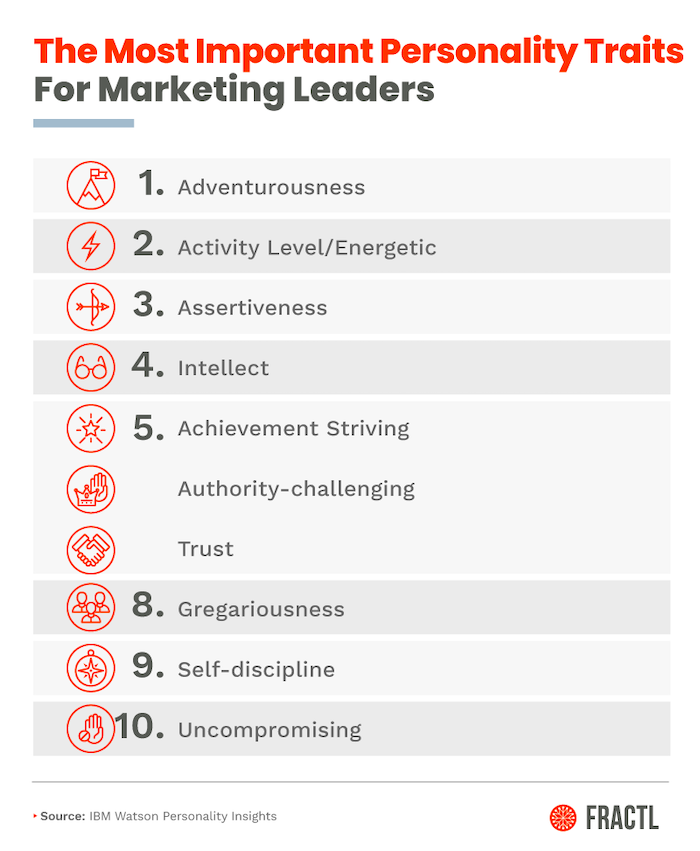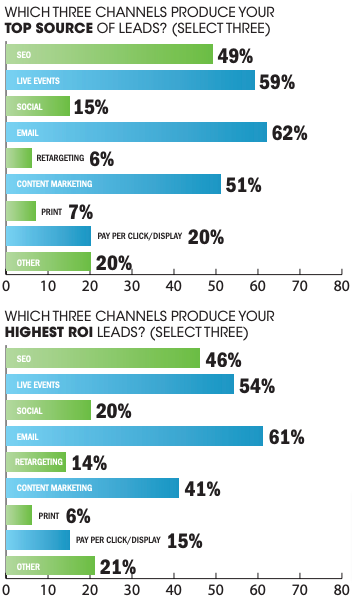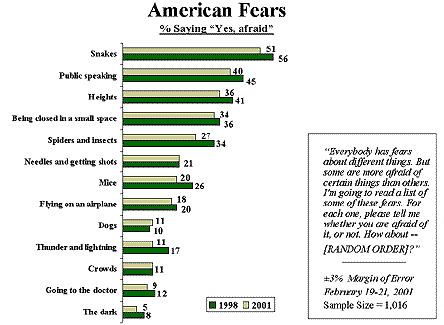What does it take to be a successful marketer?
Turns out we don’t have to guess because someone’s already done the research. Fractl used IBM’s Watson Personality Insights API from 2019 to pick out the key traits and characteristics of 20 of the world’s most prominent marketing leaders (I even made the list!).
According to the study, the No. 1 trait shared by marketing leaders is adventurousness, followed by high energy levels, assertiveness, and intelligence.

One interesting thing about this is that you’d also find a lot of those traits in people with exceptional presentation skills.
To put yourself out there and present to a room full of people, you need to be at least a little adventurous. If you’re not a high-energy person, you’ll find it hard to keep people engaged. If you’re not assertive, you’ll struggle to communicate your points effectively. The list goes on.
That’s not a coincidence. To make it as a marketer, excellent presentation skills are pretty much nonnegotiable.
3 Reasons Presentation Skills Are Important in Marketing
In a way, marketing is one big presentation. When we write a blog post or appear on a podcast, we’re presenting. When we research our audience, we’re trying to understand better what they want to see and learn from our presentations.
In other words, strong presentation skills underlie pretty much every aspect of marketing. If you can deliver an incredible presentation, you can:
1. Having Good Presentation Skills Drive Trust in Your Brand
What makes people trust brands? According to a global survey from PR and marketing consultancy Edelman, it boils down to three key factors:
- Product experience: The most important factor, 87 percent of respondents cited their experience with a product as a reason to trust a brand.
- Customer experience: 56 percent of consumers said their own experiences with a brand play an important part in building trust.
- Societal impact: 38 percent of consumers believe a brand’s impact on society is an important factor in assessing its trustworthiness.
However, an even more crucial point underpins all of this. Without strong presentation skills, potential customers aren’t going to know about any of those things!
If you don’t tout the quality of your product, or highlight your superb reviews and testimonials, or demonstrate your commitment to making the world a better place, how will anyone know whether they can trust you?
2. Presentation Skills Help Create Brand Awareness
Ever wondered why personal social media accounts get better engagement than brand accounts? Because it’s easier to sell a person than a brand.
That’s why speaking at conferences, networking meetups, and other events can be such a useful tool for building brand awareness. It puts a human face on your brand, which instantly makes you more recognizable, relatable, and memorable. That’s why for many of us, when we hear the words Apple, Microsoft, or Tesla, we immediately think of Steve Jobs, Bill Gates, or Elon Musk.
3. Use Your Presentation Skills to Drive Sales
Your presentation skills can be one of the biggest weapons in your armory when it comes to selling your product.
According to a study from Chief Marketer, live events are the second-biggest source of B2B leads, and also generate the second-highest ROI of any sales channel.

Granted, not all those respondents would have been guest speakers at those events, but to generate leads, they would have absolutely been speaking to prospects at their display stands, during networking sessions, and even while queuing to buy a hot dog or coffee. Their one-on-one presentation skills were crucial to breaking the ice with those leads.
How to Develop Your Marketing Presentation Skills
By this point, you hopefully agree with me that presentation skills are essential for modern marketers. Now, let’s take a look at how to hone those skills to meet your marketing objectives.
1. Set Goals for Developing Your Presentation Skills
If I told you to write me a blog right now, you’d likely find it pretty tough. After all, I’ve not given you any information. You don’t have a theme, or a title, or even an audience. In short, there’s no way of knowing what I’m looking for, so you can’t gauge what success looks like.
Alternatively, if I told you to write a blog about this year’s biggest trends in SEO, aimed at marketing leaders for SaaS startups, you’d have a much clearer idea of how to proceed.
The same thing is true for developing your presentation skills. Start by defining exactly what you want to achieve, such as:
- becoming a better (or first-time) conference speaker
- delivering more impactful training sessions
- speaking more persuasively to leads
- engaging potential prospects at the top of the sales funnel
- honing your pitch presentations
Also, give yourself a deadline. Rather than generally building up your presentation skills, commit to improving your public speaking in time for a specific conference or networking event. Sign up as a speaker early; that way, you’re completely accountable for following through with your plans.
2. Research Your Audience
As well as simply “doing more of it,” there’s another extremely effective way to help you feel more confident about speaking in front of an audience: Do your research.
When you think about it, imposter syndrome is another big reason people shy away from public speaking. We worry we’ll be exposed as frauds and charlatans who don’t know what we’re talking about.
Thoroughly researching your audience will help guard against that feeling. When you know exactly who you’re talking to, it becomes much simpler to build an effective presentation.
If I’m speaking to a room of NASA engineers, I’m not going to tell them how to build a better rocket. I can’t tell them anything they don’t already know (and most of what I say would likely be wildly inaccurate).
However, I almost certainly know more about marketing than them. Maybe I’d tell them how, by sharing snippets of their work through their personal social profiles, they can build awareness and interest in what they do, which in turn, might persuade politicians that increased federal funding for NASA would be a real vote-winner. With that increased funding, they can go away and build better rockets.
With that in mind, before you start working on your next presentation, ask yourself the following questions about your audience:
- How old are they?
- Where are they from?
- What jobs do they do?
- Who do they work for?
- How experienced are they?
- What are their pain points?
The idea here is to identify the “thing” you know that’s of most value to your audience. The more you can niche down, the better. If you can’t answer some of those questions, speak to the event organizers; they should be able to help.
3. Incorporate Humor and Stories
Throughout human history, storytelling has been one of our most effective tools for influencing, inspiring, and teaching one another.
Paul Smith, author of “Lead With a Story: A Guide to Crafting Business Narratives That Captivate, Convince, and Inspire,” put it better than me when he wrote:
In any group, roughly 40 percent will be predominantly visual learners who learn best from videos, diagrams, or illustrations. Another 40 percent will be auditory, learning best through lectures and discussions. The remaining 20 percent are kinesthetic learners, who learn best by doing, experiencing, or feeling.
Storytelling has aspects that work for all three types. Visual learners appreciate the mental pictures storytelling evokes. Auditory learners focus on the words and the storyteller’s voice. Kinesthetic learners remember the emotional connections and feelings from the story.
With that in mind, another key way to improve your presentation skills is to work on your storytelling. Don’t just tell your audience how a certain tactic can get them more sales; give them specific, real-world examples that help them relate your advice to their own circumstances.
Also, don’t overlook the power of humor to engage an audience. As the British comedian John Cleese said:
If I can get you to laugh with me, you like me better, which makes you more open to my ideas. And if I can persuade you to laugh at the particular point I make, by laughing at it you acknowledge its truth.
I’m not suggesting you go away and write a 30-minute standup set, but if you can drop a couple one-liners here and there, it can go a long way to getting your audience on your side.
4. Practice in Front of an Audience
Glossophobia, or fear of public speaking, is a common complaint. One much-quoted (and very old) Gallup survey claims it’s the second-most prevalent fear in Americans, affecting 40 percent of respondents.

Clearly, it’s not the “speaking” element that puts us on edge. It’s the idea of doing it in front of an audience. What if we make fools of ourselves, or say the wrong thing and get booed off stage?
Painful as it might sound, in my experience, the best way to overcome this is to seek out opportunities to speak in front of an audience. This can be in your professional or personal lives. It can be as simple as saying a few words at family gatherings or giving small presentations to your team at work.
Use Your Presentation Skills: 5 Tips for an Effective Marketing Presentation
You’ve set goals for improving your presentation skills, done your research, crafted a handful of engaging anecdotes, and practiced in front of an audience. Now, it’s time to weave all those things together to create a killer marketing presentation. Bear these five tips in mind while you’re doing it:
1. Start Strong
According to one study, you’ve only got 30 seconds before your audience’s attention starts to lapse. That means you need a strong start to persuade them you’re worth listening to. Lead with your most eye-catching statistic, your best joke, or your punchiest anecdote, and keep it short. On average, we speak at up to 130 words per minute, so that only gives you a maximum of 65 words to play with.
2. Make a Good First Impression
Presentation skills aren’t just about what you say. They’re also about how people perceive you.
A study at California State University, Northridge, found students followed instructions far more accurately when those instructions were given by someone who was dressed casually rather than professionally.
Why did this happen? One interpretation from the study’s authors is that the students responded better to someone dressed similarly to them:
Perhaps the participants in our study felt that they were better able to relate to the experimenter in the casual-dress condition, thereby lowering their anxiety and increasing their ability to follow directions correctly.
In short, there’s no such thing as a right or wrong way to look or dress for a presentation. Rather, we should reflect our audience.
3. Come Prepared
Don’t kid yourself it’ll “be alright on the night.” If you don’t prepare properly, it won’t!
Figure out what works best for you by running through your presentation multiple times. Do you find it easiest to work off cue cards? Do you need visual aids? Or is it better for you to run lines until you’ve memorized your presentation word for word?
4. Ask Questions
There’s no better way to guarantee people are paying attention than to ask regular questions throughout your speech!
This isn’t about putting people on the spot. Instead, it’s about turning your presentation from a one-way narrative to a two-way conversation.
Say you’re giving advice on tackling a specific problem. Ask how many people had experienced that problem, when they first noticed it, and why they’re so keen to fix it.
5. Back Your Claims
There are very few instances in which you shouldn’t be supporting your claims with real evidence. Even if you’re giving your personal opinion on a topic, those opinions should be backed with actual data from reputable sources.
If I’m telling you that Facebook is the best platform to grow your business, you likely wouldn’t just take my word for it. You’d want to hear evidence about Facebook’s audience, the effectiveness of advertising on the platform, and how much it’ll cost.
Conclusion
No one is born with incredible presentation skills; not even Steve Jobs.
Sure, some of us are more confident than others at talking to an audience and getting our points across effectively. However, it takes work; and if honing your presentation skills is taking you away from other important work, like content marketing or SEO, our agency is here to help.
The good news is the harder you work at it, the more confident you’ll feel, and the better your presentation skills will become. It’s a virtuous circle!
What tips have you used to level up your marketing presentation skills?

See How My Agency Can Drive Massive Amounts of Traffic to Your Website
- SEO – unlock massive amounts of SEO traffic. See real results.
- Content Marketing – our team creates epic content that will get shared, get links, and attract traffic.
- Paid Media – effective paid strategies with clear ROI.

